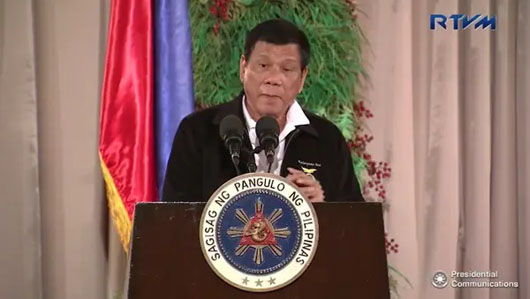by WorldTribune Staff, February 13, 2020
The Philippines announced Tuesday that it would end a security agreement with the United States that has been in place since 1999.
Nationalist president Rodrigo Duterte, at times a harsh critic of the United States, has been pivoting back and forth between the U.S. and toward China since entering office in 2016.

The Philippines has been a vital strategic asset for the United States in Asia as the Trump administration seeks to maintain a forward military presence in the Pacific and counter Chinese expansion in the South China Sea, as well as deter an unstable North Korea.
The Visiting Forces Agreement (VFA) is one of three defense pacts governing what Washington has called an “ironclad” relationship. It exempts U.S. military personnel from immigration regulations when they deploy to the Philippines. The two other pacts which could be in jeopardy because of this decision are the Enhanced Defense Cooperation Agreement made under the Obama administration in 2014, and a 1951 Mutual Defense Treaty.
Duterte’s move to end the VFA was allegedly triggered by Washington’s decision last month to cancel the U.S. visa of the former chief of National Police who brutally enforced Duterte’s “war on drugs.” Duterte then threatened to end VFA if the U.S. did not restore the visa.
However, Renato de Castro, professor at De La Salle University in Manila, told NPR that the decision to scrap the VFA is part of “Duterte’s desire to do away with the U.S., so there is no obstacle in his pivot to China.” He says the cancellation of that visa “is merely an excuse.”
Some Philippine senators sought to block Duterte’s move soon after news of it broke, arguing that he had no right to unilaterally scrap international pacts the Senate had ratified.
Significantly, last week, prior to his tweeting the end of the pact on behalf of Duterte, Philippine Foreign Affairs Secretary Teodoro Locsin, Jr. had emphasized to the Senate the crucial security, trade and economic benefits that the accord provides. “Terminating the VFA will negatively impact the Philippine security and defense arrangements,” Reuters reported he said, adding, “Our contribution to regional defense is anchored on our military alliance with the world’s last superpower.”
While Duterte’s spokesman was quoted by Philippines Star as claiming, “the president will not entertain any initiative coming from the U.S. government to salvage the VFA, neither will he accept any official invitation to visit the United States,” in one later tweet reported by NPR, Locsin seemed to suggest the cancellation of the pact was mostly a bargaining tactic aimed at gaining concessions from Washington. Both countries have 180 days to negotiate any differences and keep the pact.
About a third of global shipping passes through sea lanes in the South China Sea, and the U.S. Navy conducts Freedom of Navigation Operations in those waters to ensure they remain open. As reported by NPR, the U.S. also conducts joint military exercises such as the annual joint exercise Balikatan, or “shoulder-to-shoulder,” in Tagalog, with Filipino troops, as well as occasional Australian and Japanese forces. The U.S. provided $550 million in military assistance to the Philippines from 2016 to 2019, and $1.3 billion since 1998.
As the Australian site News.com.au notes, China has been steadily expanding its military reach in the area and claims the entire South China Sea, but only borders the northern edge. Its controversial militarized artificial islands have partly secured the sea’s middle for China. But it has nothing to control the extreme south. To remedy that disadvantage China is apparently building a secret military airbase in Cambodia at Dara Sakor. China also recently signed a deal to rebuild and expand Cambodia’s main Ream naval base at Sihanoukville, according to the Wall Street Journal. This will allow China’s navy access for the next 30 years.
These bases will give the People’s Liberation Army Air Force (PLAAF) and Navy (PLAN) access to waters contested by Vietnam, Malaysia and Indonesia, as well as the strategically vital shipping lane of Malacca Strait.
If China were to establish any type of basing or military relationship with the Philippines to the east, due to any U.S. withdrawal, it would severely limit the United States’ ability to counter these Chinese moves and would cede China significant influence over the entire southern area of the South China Sea. This is something the U.S. hopes to avoid.
Intelligence Brief __________ Replace The Media
